Two remarkable debuts highlight CSO’s mostly Russian program

Besides Russian late-Romantic sumptuousness, if there was a common thread to be found the CSO’s concert Thursday night, it may well have been promising firsts.
Tchaikovsky’s Piano Concerto No. 1 in B-flat minor ended up, for better or worse, being one of his most famous works and certainly his major contribution to the genre. On the contrary, Rachmaninoff’s Symphony No. 1 suffered a disastrous 1897 premiere—Alexander Glazunov is said to have conducted it while drunk—after which the mortified composer hid it away, never to be heard again during his lifetime. Even the CSO didn’t perform the symphony until 2010—a shame, given how assured the piece sounds under a sensitive interpreter.
As it turns out, both works were in good hands on Thursday, thanks to two musicians making remarkable debuts of their own as first-time CSO guests. Thomas Søndergård, music director of the Royal Scottish National Orchestra, led the program, with pianist Alexander Gavrylyuk appearing as soloist.
To lead off the program Søndergård did Chicago a favor and reintroduced Sibelius’s King Christian II Suite into the CSO’s repertory, here performing just two movements. (The neglected suite was last performed by the CSO in 1946.) Unlike Rachmaninoff in his First Symphony, Sibelius seems to be grasping for his compositional voice in King Christian, coming off uncannily like Tchaikovsky in the process. From the unrepentant lyricism of the Nocturne to the flamboyant tantrums of the Ballade, the orchestra performed with tenderness and conviction, responding readily to the Danish conductor’s languid, genial podium presence.
Sandwiched by more obscure delights, Tchaikovsky’s piano behemoth could easily have been the program’s anticlimax, but that was not the case with Gavrylyuk as soloist. The Ukrainian-born pianist’s approach to the warhorse was wholly embracing, preferring affection to affectation, with subtly novel explorations. His interpretation toggled from transparent intimacy—the solo section before the second theme nearly sounded like Chopin—to dramatic passion, and his cadenzas were just as individual.
Gavrylyuk luxuriated a bit too much in the details of the Andantino, bogging down the overall sweep of the movement, the orchestra holding its collective breath to sustain the unconventionally slow tempo. But CSO and soloist were one again in a playful but never frantic third movement, Gavrylyuk charmingly tossing off the terpsichorean rhythms before its rousing conclusion.
After the Tchaikovsky’s virtuoso showcase, Gavrylyuk elicited smiles with an earnest performance of Schumann’s Kinderszenen No. 1 as an encore—coupled with sighs of relief when someone in the upper balcony finally silenced their ill-timed cell phone alarm.
Though himself very much under Tchaikovsky’s sway, the 22-year-old Rachmaninoff clearly forged a voice of his own with his Symphony No. 1. The meandering, sometimes obtusely motif-driven writing (every movement opens with the same four-note flourish) indicates that the young composer still had much to learn by way of structure. But as an orchestrator, he’s eerily mature—some sections would sound right at home in his mature symphonies and Symphonic Dances.
Søndergård and the CSO’s subtle shadings more than redeemed a piece that is ultimately not much in need of redemption. Søndergård’s steady hand unfurled controlled tempests in the first movement, though the symphony’s calling card may be its cheeky, dance-hall-like second movement, featuring a quick-stepping solo Thursday night by concertmaster Robert Chen.
The third movement, with warm muted strings and excellent solos by clarinetist John Bruce Yeh made it a tender, if understated respite from the surrounding action. Expanded percussion personnel and sonorous CSO brass topped off the festive fourth movement, its fearsome final bars sounding like the steps of a terrible giant.
One hopes audiences won’t wait so long next time to hear King Christian and Rachmaninoff’s earliest symphony on a CSO program. And ideally, they’ll see Thomas Søndergård and Alexander Gavrylyuk back in Chicago even sooner.
The program will be repeated 7:30 p.m. Friday at Wheaton College’s Edman Memorial Chapel, and 8 p.m. Saturday and 3 p.m. Sunday at Symphony Center. cso.org; 312-294-3000
Posted in Performances





